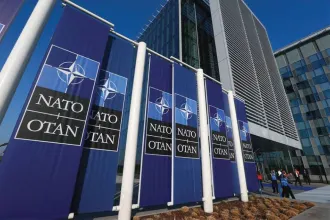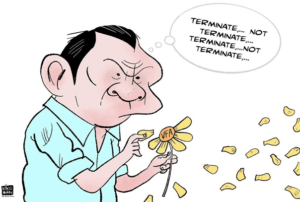
IT is no joke, but we are in the most dangerous geopolitical and economic situation since 1945. We are facing a world where inflation has become a real problem. We are facing a world where a global economic recession is unfolding before our very eyes. We are in a situation where most countries face impending energy and food crises, and the ones most affected are emerging economies like the Philippines, which are commodity importers.
Globally, the Ukraine crisis, a hybrid proxy war between the United States and its NATO allies against Russia, has resulted in many problems, including higher inflation and tightening financial conditions. It is continuously adversely impacting the already dire economic situation of the world brought about by the Covid-19 pandemic. It is affecting the global energy markets undesirably. It is not only Europe that bears the brunt of the ongoing war in Ukraine but the rest of the developing world, like the Philippines and the least developed economies.
Asia and the Philippines may be far from Ukraine; nonetheless, what’s happening in that part of the world is affecting the country and the rest of the world without exception. In any case, being aware of the economic consequences of the Ukraine crisis is one thing. Still, drawing lessons from the experience of Ukraine is something that is of great value and deserves consideration.
Hence, weighing on what’s going on in Europe, the key question now for most Asians and Filipinos, in particular, is, would we allow a similar military crisis or a war to take a foothold in the Asia Pacific region?
China threat rhetoric
In the advent of US Defense Secretary Lloyd Austin’s visit to the Philippines this week, which centers on convincing and influencing further the current Marcos Jr. administration to push through with the additional five EDCA bases, many of which are facing Taiwan and near the disputed South China Sea (SCS), enhanced joint patrol in the West Philippine Sea (WPS) between the US and the Philippines, and deployment of more US troops and military assets on Philippine soil, it is imperative to at least inquire if in any case, the current administration under President Ferdinand Marcos Jr., will finally capitulate and bow down to the pressures of Uncle Sam. The answer to this question will definitely be most intriguing.
Moreover, to justify the pursuance and accordingly to strengthen commitments between the Philippines and the US under the Mutual Defense Treaty (MDT), using the “China threat rhetoric” over the disputed SCS and the Taiwan Strait question while pushing for the installation of an additional five US military bases through the EDCA, pre-positioning US military assets, more US troops on Philippine soil to be situated in Northern Luzon near the disputed SCS and facing Taiwan, and enhanced joint patrols in the WPS between the Philippines and the US, is deceptive, misguided and misleading. This is akin to militarizing the Philippines. This will lead to the possibility of war between superpowers at the expense of the Philippines. I don’t think this is the way forward for the Philippines.
Worst case scenario, if things go wrong and a war in the Asia/Indo-Pacific region breaks out, the Philippines will end up collateral damage. The country may end up with the same fate as Ukraine. Is this what we want for the Philippines? Will we allow ourselves and our country to be used as a pawn or proxy of the US chess match with China in the same manner that the Ukrainians allowed their country to be a pawn in the proxy war between Russia and the US alongside its NATO allies?
Look at what’s happening right now. The Ukraine crisis is bleeding the world. Do we want a repeat of the Ukraine crisis in Asia? Do we want to be the next Ukraine in Asia? I really hope not.
Peace or war
I guess it’s high time Filipinos choose a side, whether we are for peace or we are for war. Bowing down to the pressure from Uncle Sam to make the Philippines its launching pad for a military confrontation with China through the full implementation of EDCA, additional five EDCA bases, enhanced joint patrol on the disputed SCS, and deployment of more US troops and military assets on our soil is analogous to choosing war over peace.
Filipinos must open their eyes to the glaring reality that the US is using the Taiwan Strait question and the SCS dispute to suit its geostrategic and hegemonic interests at the expense of another country, the Philippines in this regard, to preserve its dominance in Asia and beyond, which has been challenged by the rise of China to a greater extent. This is the crux of the matter and the most important thing that the current administration must consider and figure out, given the obsolete and lopsided MDT, EDCA and Visiting Forces Agreement (VFA). Indeed, these scenarios are for the current administration under BBM to ponder.
Filipinos and the Marcos administration must reflect on the cost and the consequences of being subservient to Uncle Sam’s wishes, given the volatile geopolitical realities of the Asia/Indo-Pacific region. The current administration must exercise caution and prudence and be more sensitive to geopolitical issues of great importance and consequence to us as a country and as a people.
The Philippines has no enemies and should not create one at all costs. Our relations with each country should be based on our national interest and on what’s good for the country and not for the benefit of other countries at our expense. The Philippines is a friend of China and the US. US enemies or adversaries are not the country’s enemies/adversaries, and the current administration must emphasize this. As a country, we should uphold our national interest. Avoiding being a pawn or proxy of the US and avoiding being dragged into any conflict not of our own making is very much part of our national interests as a sovereign country.
Conclusion
Again, real talk dictates that as a country, the Philippines needs to be on the side of peace and must exert all efforts not to be dragged into any military conflict, for that is detrimental to the existence and survival of the country. In doing so, a genuine and authentic independent foreign policy, with peace as its core value in every sense, is the way forward. Abrogating EDCA and the VFA, and revisiting the MDT, is like a liberation for the Philippines from the indirect control and its subservience or the state of being submissive to the US, especially in military aspects. Whoever doesn’t understand this is a lost cause.
Filipinos and Asians alike must be mindful of the fact that peace is an essential precondition to economic progress and development. Without peace, economic progress is not possible.
The Ukraine crisis is a living testament that wars/conflicts can easily wipe out all economic development and progress achieved not only by Ukraine and Russia but all countries across the globe. In war, there are no winners, only losers.
The complications of geopolitics are indeed costly. The Philippines and the Global South can’t afford it. But the path toward economic development benefits countries and their people. The path to peace creates security and stability, and we achieve economic prosperity through peace and stability.
Source: The Manila Times
https://www.manilatimes.net/2023/02/02/opinion/columns/economic-and-geopolitical-risks-confronting-marcos-presidency/1876881


